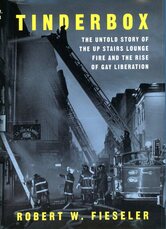A WRITER'S WIT |
My Book World

On June 24, 1973, manager of the Up Stairs Lounge, in New Orleans, a gay bar, ejected a disgruntled and emotionally damaged individual for fighting, and he returned with a seven-ounce can of lighter fluid. Dispersing the entire container of accelerant, he set the entrance on fire which spread almost instantaneously, trapping scores of gay men and a few women upstairs. Because the establishment was cursed with a number of unchecked fire hazards, the blaze trapped and killed, in the end, thirty-two individuals, three of whom were never identified their bodies were so badly charred.
Journalist Fieseler does a persuasive job of tracing the history of this event, developing the characters of its key players, limns a portrait of the arsonist and his personal difficulties, as well bringing to light the tepid response of the New Orleans community, including a police department more comfortable taunting gay men and treating them like second-class citizens than attempting to conduct an investigation of the fire.
On that June night in 1973, I myself was twenty-five years old, not quite out of the closet, and because news of the fire only made it to print in the largest of national newspapers, I’m sorry to say I never knew of it until I read this book. Earlier, in 1971, I had visited New Orleans as part of a seminary choir tour, in which, without my young wife around, I drank, smoked (along with other seminarians), and tossed a choir stole around my neck like a feather boa, as I sauntered through the French Quarter. Halfway out the closet door, I would not shed my wife until 1975; I would not come out entirely until age twenty-seven, feeling as if I had lived a lifetime without knowing why. Reading now of the fire, I think, under different circumstances, I could very well have been one of those victims. The Up Stairs Lounge, after all, was also home to MCC (Metropolitan Community Church), a national movement of gay Christian congregants. Not by the farthest stretch of the imagination—had I concluded my seminary studies at SMU, and had I accepted a job in NO—might I have been present that disastrous evening.
Fieseler has earned our gratitude for bringing to light this long-forgotten story and for bringing it before the public’s attention when, once again, fragments of our society are acting with hatred against anyone who isn’t a white heterosexual male. As with any holocaust, every story must be told.



 RSS Feed
RSS Feed